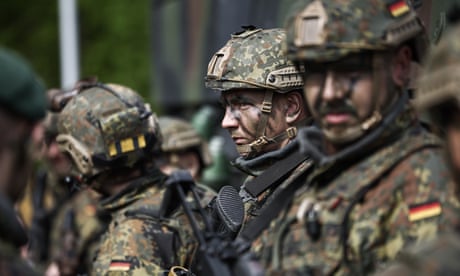
The German parliament has passed a bill creating the first post-unification Veterans’ Day, breaking with a long-held taboo around veneration of soldiers as the country faces up to new looming threats.
MPs in the Bundestag lower house approved the proposal to create a memorial day on 15 June each year, after an agreement between the government and the conservative opposition earlier this month.
The once-unthinkable step is seen as an attempt to boost public acceptance of the armed forces while making service in the volunteer army more attractive as Europe’s top economy dramatically ramps up its defence capabilities.
The parliament’s commissioner for the military, Eva Högl, said the move to extend “respect, appreciation and gratitude” to the more than 10 million men and women who had served was long overdue.
She cited the mental and physical toll of deployment in crisis zones around the world, and said she hoped the day would provide a forum for a broad societal debate about war and peace.
The defence minister, Boris Pistorius, who leads his boss, Olaf Scholz, the chancellor, by some distance in popularity rankings, told MPs that the day would serve to counteract the presumption “that our lives in freedom and peace are a given”.
Veterans’ Day, which will not be a bank holiday, will honour all Germans who have worn the uniform, not only those wounded or killed in combat, according to the legislation put forward by the centre-left-led ruling coalition and the Christian Union party.
Only the far-left Linke raised objections to the initiative, which foresees measures to address the needs of active soldiers as well as veterans and their families, including improved therapy options to address post-traumatic stress.
The 15 June commemorations, modelled on Armed Forces Day in the UK and Veterans Day in the US, will fall on the anniversary of the first time the German military, the Bundeswehr, issued veteran badges, in 2019.
There have been calls in Germany for more than a decade to introduce a day dedicated to current and former members of the military but the most recent attempt to pass a measure, in 2012, failed in the face of widespread political and social opposition.
While communist East Germany celebrated its National People’s Army with military parades, West Germany maintained an enduring ambivalence given the role of German soldiers in two world wars and the Holocaust.
The reunified country is still heavily reliant on the US armed forces and intelligence services for its own security, despite a surge in military spending since the Russian invasion of Ukraine.
The Bundeswehr top brass says years of chronic underfunding have made the military unfit to fight, and Pistorius has raised eyebrows by urging German society – not just the armed forces – to become more kriegstüchtig, or war-ready.
Thomas Wiegold, a military affairs expert, told the Guardian that the call also extended to preparedness for crises such as natural disasters, but that the alarm bells about new security challenges had met with mistrust.
“In Germany you have an east-west split whether you see a threat from Russia as realistic, and interestingly it tends to be discounted in the east,” he said.
The left wing of Scholz and Pistorius’s Social Democrats was also defiantly sceptical, he said, “not to mention the [far-right] AfD”.